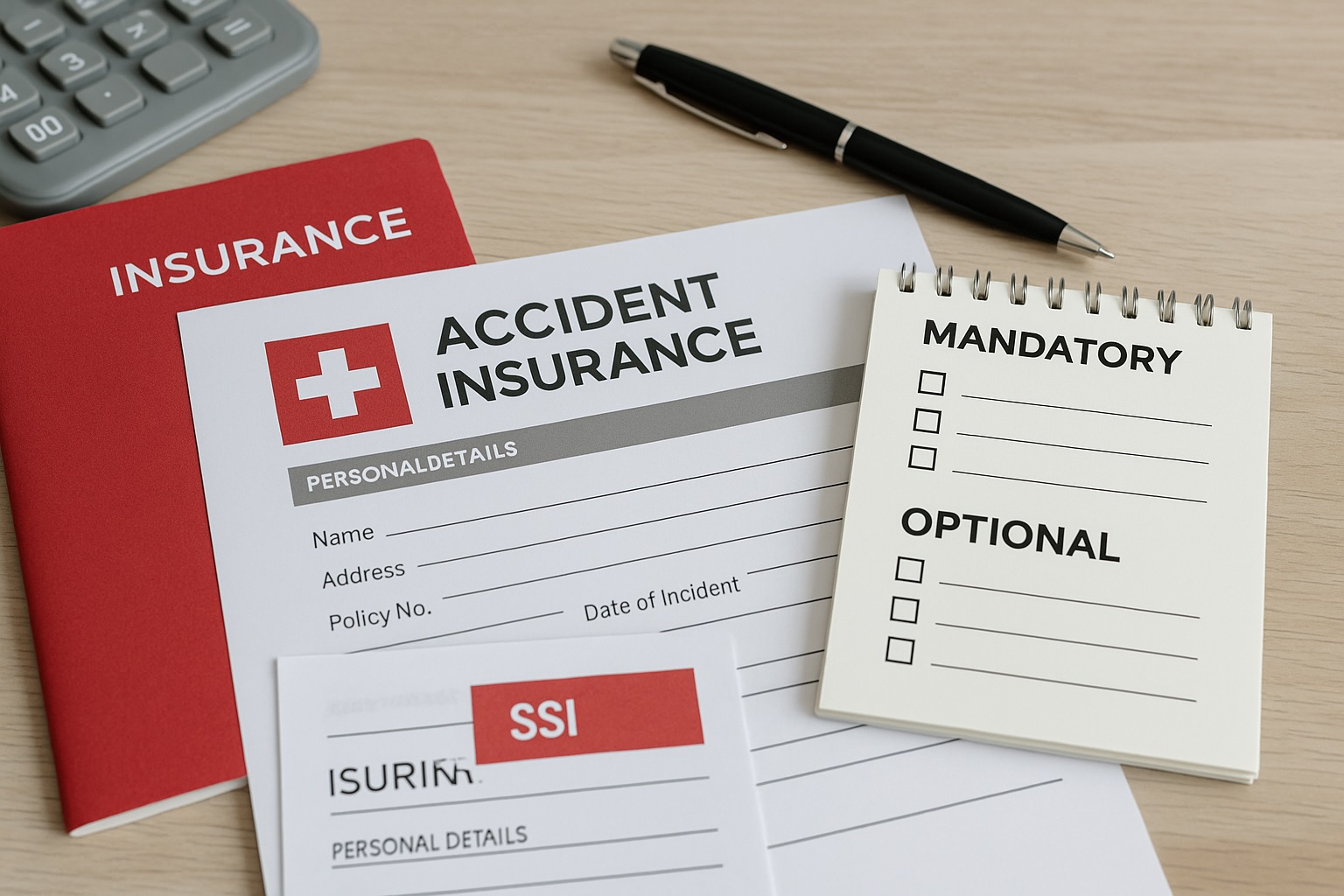Accident insurance (“Unfallversicherung” in German, “assurance accidents” in French, “assicurazione infortuni” in Italian) is an essential part of Switzerland’s social protection system. Anyone living or working here must understand what’s covered, who pays for it, and whether optional coverage makes sense based on your lifestyle or employment. This guide, tailored for expats, clarifies what’s mandatory, what’s optional, and how to manage your accident insurance effectively.
1. What Is Accident Insurance?
Swiss accident insurance covers medical costs and income replacement for injuries sustained in:
- Work-related accidents (on the job or during commuting)
- Non-occupational accidents (in your free time, like a fall or sports injury)
It ensures you aren’t left with the full financial burden after an unforeseen event during everyday life or work.
2. Who Is Automatically Covered?
Employees
If you work at least 8 hours per week for a single employer, they must register you for accident insurance through your pension fund. This covers both professional and non-professional accidents, and the employer pays most of the premium.
Part-time Employees (under 8 hours/week)
Your employer covers only work-related accidents. To cover non-work accidents, you must opt in within 30 days of starting the job, or wait until your commune or cantonal health office reminds you.
Self-Employed
Self-employed individuals are not covered by employer insurance. You must purchase private accident insurance (often bundled with health or supplementary coverage).
Students & Unemployed Persons
Accident insurance may be provided through:
- Schools or universities, if they include it in fees
- Unemployment insurance (after registering and contributing)
- Accident-insurance add-ons in health insurance packages
Consult your insurer to confirm coverage.
3. What Does the Mandatory Policy Cover?
Swiss accident insurance reimburses:
- Medical treatment: Hospital stays, surgeries, medications, physiotherapy
- Rehabilitation and therapy
- Transport and rescue costs, if related to an accident
- Daily allowances: 80% of lost earnings during recovery
- Disability benefits: If the accident leads to a lasting incapacity
- Survivor’s pension: Up to four children or spouse after a fatal accident
Coverage continues until age 70 for professional accidents, but non-professional accidents are only covered until age 65 unless you opt in after 65.
4. How Much Does It Cost?
Employees
- Employer pays for work-related accident premiums
- Non-professional accident insurance premiums are typically deducted from your salary (around 1–1.5% of your earnings)
Self-Employed / Individuals
Cost depends on risk factors:
- Sports activities, age, and the deductible level
- Premiums are often bundled with health or supplementary accident insurance
Premiums range from CHF 200 to CHF 700 annually, depending on coverage and risk.
5. Optional Coverage: Why You Might Need It
Even if covered by mandatory insurance, the statutory scheme may fall short for high-cost scenarios. Here’s where optional private insurance helps:
a)
Excess and Deductibles
Mandatory coverage may have deductibles and co-pays, which add up quickly—private insurance can cover those gaps.
b)
Upper Coverage Limits
For disabilities causing long-term loss of income, standard policies offer a maximum daily allowance of CHF 196. Higher-income earners should consider supplementary insurance.
c)
Global Coverage
Mandatory insurance is valid only in Switzerland and during Swiss travel. Travelers should get international accident insurance for global coverage.
d)
Holistic Protection
Top-up plans can include:
- Coverage during sports (skiing, mountain biking)
- Alternative therapies (chiropractic, osteopathy)
- Enhanced rehabilitation or barrier-free housing modifications
6. How to Choose the Right Accident Insurance for You
- Assess Your Employment Status
- Full-time employees are automatically covered for work accidents.
- If you work under 8 hours/week, add in non-work accident insurance.
- Self-employed need comprehensive private coverage.
- Define Your Risk Profile
- Consider your sports activities, job hazards, and travel habits.
- Choose a deductible that matches your risk tolerance and budget.
- Compare Plans
- Use platforms like comparis.ch or bonus.ch to explore options and pricing.
- Don’t just compare premiums—examine co-pays, exclusions, and waiting periods.
- Check for Add-ons
- Look for daily allowance boosts, better rehab coverage, global extension, or excess protection.
- Mind the Policy Age Caps
- Non-professional accident coverage ends at age 65 by default.
- Get informed about extended or renewed policies for older adults.
7. Claiming Accident Insurance: What to Do
- Seek immediate medical attention for injuries.
- Notify your insurer promptly—most require notification within 5 days.
- Send documentation: medical records and work stoppage proof if applicable.
- Receive payments for medical costs and daily allowances directly from insurer.
- Keep copies of hospital bills, receipts, and medical summaries—your insurer may reimburse them.
If you’re self-employed, maintain a clear record of income lost due to accident. An accountant or insurer can help calculate replacement amounts.
8. Tips to Maximize Your Accident Insurance
- Inform your employer if your hours change—coverage status could change.
- Be aware of deductible levels—choosing a low deductible may save money during long recovery periods.
- Take advantage of discounts for non-smokers, safe jobs, or low-risk sports habits.
- Review coverage annually—your insurance needs may change with life (new job, increased income, hobbies).
9. Common Mistakes and How to Avoid Them
- Assuming you’re fully covered without checking contracts or policies.
- Overlooking deductions from non-work accident premiums.
- Ignoring travel insurance—overseas accidents are not covered.
- Not notifying employer or insurer about part-time work.
- Letting coverage lapse at extendable age limits.
10. Final Thoughts
Accident insurance in Switzerland is more than a legal requirement—it’s vital protection that ensures you’re financially secure during recovery from unexpected injuries. As an expat, it’s important to know exactly what your mandatory coverage includes and where additional protection may be needed.
By evaluating your employment status, understanding your risk factors, and choosing top-up plans wisely, you can build an accident insurance setup that truly keeps you safe—both in Switzerland and abroad.
